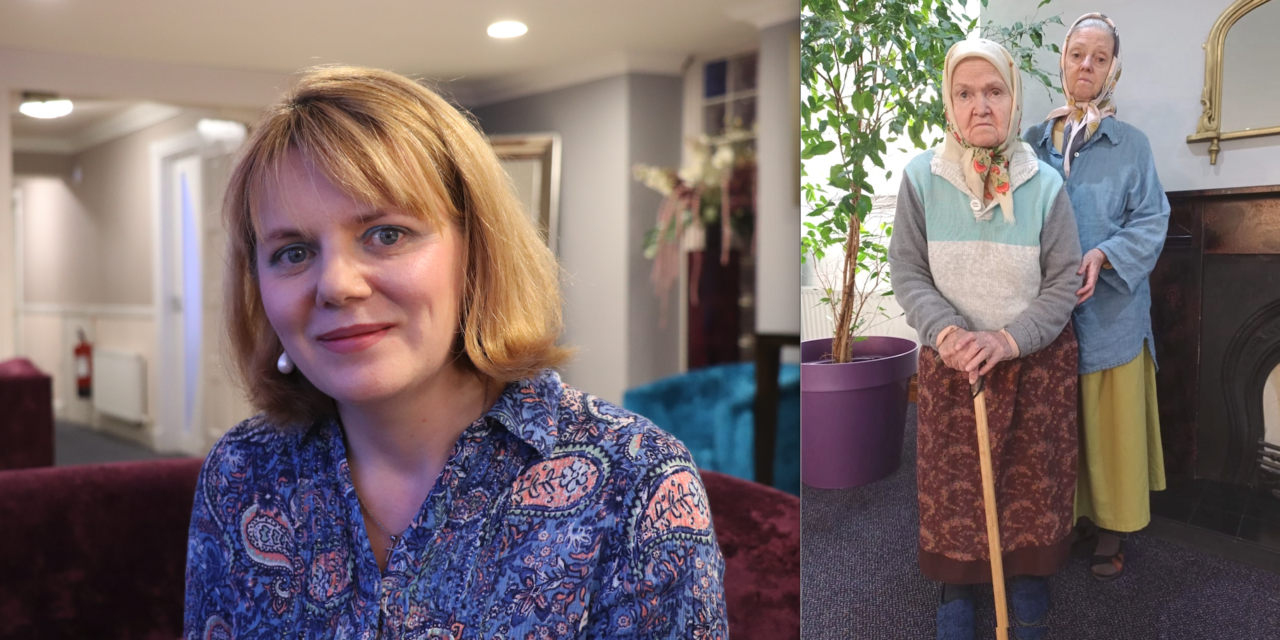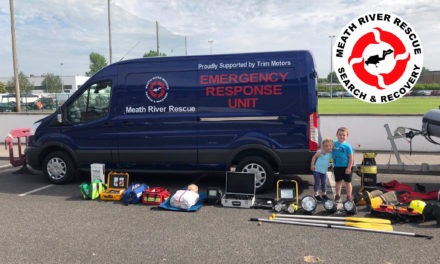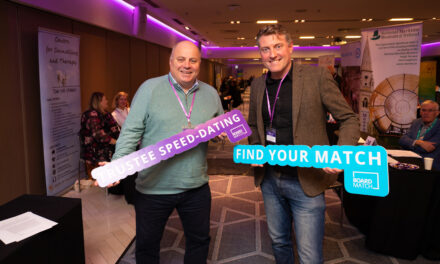The Irish don’t forget their history. That’s the impression I got when I came to Ireland and found out more about her. It is very important to remember your history. It will help to prevent future tragedies that happened in the past. I found out there were extremely sad pages in Irish history such as famines.
So I decided to tell you the story of Ukrainian mother and daughter Halyna (90) and Svitlana (66). I think many readers here in Ireland can relate to what they’ve told me. Halyna and Svitlana remember well the times of great upheavals in their Homeland.
CAPTION: Journalist Olesya Vasylenko (left) and her interviewees Halyna and Svitlana (right). All three are from Ukraine and are among the millions forced to flee Russian bombs. They now live in Co. Kerry.
– Interview by journalist Olesya Vasylenko
Halyna was born in the Sumy region (northeast of Ukraine) in a family of peasants. Her grandfather lived in a homestead inherited from his father. The family had a big garden with apple and pear trees.
“There was no such a big garden in the whole area,” Halyna recalled. Her grandfather’s brothers lived on the same street. Before the Russian Revolution he owned a lot of land. Her grandfather, Halyna said, was a very industrious man who reaped great benefits from his hard work. The family had a big field. In half of it they planted potatoes and other vegetables. In the other half they grew wheat and rye which gave a decent harvest.
During difficult times in his country, Halyna’s grandfather tried to save grain for the future. So he put vats in large pits dug out in the earth and covered them with wooden boards and dense homespun tablecloths. In those hidden vats, Halyna tells, the grain was stored.
The Famine – the Holodomor – which came upon the land of Ukraine in 1932 brought great distress. Starvation was caused artificially by Stalin regime. According to a recent study “Genocide of Ukrainians in 1932-1933 based on the materials of pre-trial investigations”, the number of victims of the Holodomor is 10.5 million people. It was terror by famine.
Soviet government representatives came to each house and took away all the grain from Ukrainian peasants.
It was almost a miracle the wheat hidden in large vats in the earth wasn’t found out. Halyna remembers that time. Her mother got up at four o’clock every morning. She stoke the stove and baked bread for the family. Later, going to work, she cut off half of a fresh loaf and handed pieces out to her relatives who faced starvation and could hardly move.
To survive, they also picked meadow flowers near the river, ground them and baked so called ‘bread’. It looked like a loaf but it hardly gave any nutrition.
While Halyna’s mother rescued their relatives from starvation, unfortunately, Svitlana recalls, the family couldn’t help other people in the village. Her grandmother was afraid the grain would be found and taken away. So she gave bread only to close relatives who wouldn’t tell their secret.
When the Second World War started, Halyna’s father went to the front. Three sisters stayed with their mother. Difficult times came again and people began to steal sheaves of wheat in the fields. So her mother spent nights sitting near her sheaves and guarding them. In the mornings she had to go to work.

• Halyna (90) and Svitlana (66) now live in Co. Kerry.
Occupiers conscripted young Ukrainians for forced labour in Germany. To avoid this, Halyna’s older sister and her friend hid in the woods. As Svitlana tells, their mother brought them food. She did it at night so no one would see. Because partisans put up a resistance, German occupiers conducted raids throughout the area. They controlled the locals to stop them bringing food to partisans.
One November night, Halyna’s mother, as usual, went to the woods to feed the girls. To get there she had to go through riverside meadows with large water-filled pits made by explosions. Suddenly she heard the sound of a German car. She jumped into a pit and stood in ice-cold water for a long time waiting for the Germans to leave. Halyna was happy that her mother didn’t drown and didn’t die of hypothermia.
During the Second World War, as Halyna tells, her father was wounded three times. But his ingenuity helped him to survive at the front. During the war it wasn’t always possible to deliver provisions to soldiers and they starved, so Halyna’s father cut the meat from the slaughtered horses and cooked chowder for himself and for others. During the (WWII) battle for Kyiv’s liberation he received a heavy injury. Despite being seriously wounded he ran and after covering a distance he fainted and woke up in a different city. He was taken to the hospital where he spent a lot of time recovering.
After so much hardship, Halyna and Svitlana never thought that war would touch their lives again. That they, in their 90s and 66, would flee its horrors to another country. They took a very long journey to Ireland.
The women don’t know what the future holds for them but at least for now they are safe. Halyna and Svitlana are very thankful for love and care they receive here in Ireland. The Ukrainian mother and daughter pray for all their benefactors every evening.
“The Irish are probably the kindest people in the world and we’ll be grateful to them for the rest of our lives,” Svitlana says.
UKRAINIANS IN IRELAND – Hanna, founder of Kharkiv family project “loves people so much”
Groups up support for host families amidst urgency to accommodate refugees by September
21 reasons why Ireland is BETTER today for taking in refugees – ON THE OTHER HAND…
Red Cross too slow: Irish farmer hosting Ukrainian refugees on why others should do the same





